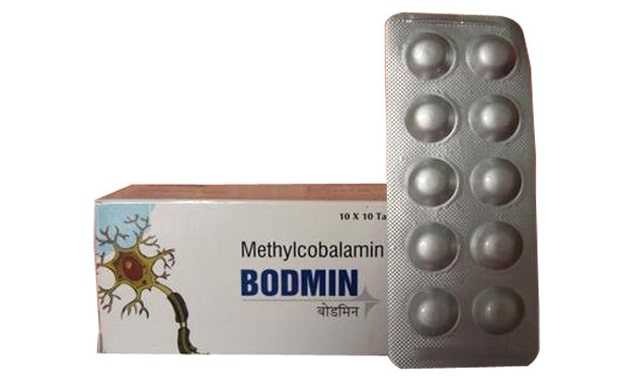Vitamin B12 is the common name for a nutrient known scientifically as methylcobalamin. It's used as a dietary supplement and to treat certain anemias .Methylcobalamin is the methyl form of cobalamin obtained from hydroxycobalamin, either by chemical manipulation in the laboratory or in the body as a natural process. It is involved specifically in the normal metabolism of folate and the consequent maintenance of normal homocysteine serum levels.
Methylcobalamin has been used in patients who is having the deficiency of vitamin B12 and in those with diabetes and other neuropathies. Use in dementia is advocated, aside from correcting deficiencies.
Mecobalamin 1500 MCG Tablet occurs naturally and in pure form of Vitamin B12. It is taken to regulate certain vital bodily functions like cell multiplication, blood formation, and protein synthesis. This drug is used to treat Vitamin B12 deficiency in people with Pernicious Anemia.
Vitamin B12 also helps the body to make red blood cells.
If someone is having low levels of vitamin B12, that person may feel weak, have less energy, and experience slow thinking , it is a condition called pernicious anemia.
It is important to treat vitamin B12 deficiency with hydroxocobalamin or cyanocobalamin or a combination of adenosylcobalamin and methylcobalamin, not methylcobalamin alone.
Therapeutic Indication:
- Methylcobalamin has been used as a supplement in patients with vitamin B12 deficiency in those with diabetes and other neuropathies.
- Also Indicated in dementia
- Used for the production of red blood cells
Pharmacology:
Mechanism of Action:
For many years, the B12 group of vitamins had been used to treat pain. Vitamin B12 was categorised as an analgesic drug. It was suggested that vitamin B12 may increase availability and effectiveness of noradrenaline and 5-hydroxytryptamine in the descending inhibitory nociceptive system . MeCbl exerted therapeutic effects on neuropathic pain in diabetics. But the analgesic mechanisms of MeCbl remained elusive till now.
It works by functioning in the production of a compound called myelin, which covers and protect nerve fibers. It rejuvenates the damaged neuron.
Pharmacodynamics:
As a coenzyme of methionine synthetase, methylcobalamin plays an important role in transmethylation in the synthesis of methionine.Mecobalamin is well transported to nerve cell organelles, and promotes nucleic acid and protein synthesis. Experiments with cells from the brain origin and spinal nerve cells in rats shows that mecobalamin is involved in the synthesis of thymidine from deoxyuridine.
Methylcobalamin promotes myelination phospholipid synthesis : Mecobalamin promotes the synthesis of lecithin which is the main constituent of medullary sheath lipid.
Methylcobalamin restores delayed synaptic transmission and diminished neurotransmitters back to normal : it also restores end-plate potential induction early by increasing nerve fiber excitability in the crushed sciatic nerve in rats.
Pharmacokinetics:
(1) Absorption: the substance of Vitamin B12 bind to intrinsic factor, a glycoprotein secreted by the gastric mucosa, and are then absorbed from the gastrointestinal tract. Gastrointestinal tract absorption can also occur by passive diffusion Single-dose administration When methylcobalamin was administered orally to healthy adult male volunteers at single doses of 120 µg and 1,500 µg during fasting, the peak serum total vitamin B12 concentration reached after 3 hrs for both doses, and this was dose-dependent.
There was a gradual increase which peaked at about 2.8 times the initial value at the 12th week of dosing.
(2) Distribution: Vitamin B12 is bound to specific plasma proteins called transcobalamins. Vitamin B12 is stored in the liver. It diffuses across the placenta and appears in breast milk also.
(3) Excretion: Vitamin B12 is excreted in the bile, and undergoes enterohepatic recycling , some part of a dose is excreted in the urine, most of the dose in the first 8 hours . 40-80% of the amount of total B12 excreted in the urine by 24 hrs after single-dose administration is excreted within the first 8 hrs.
(4) Elimination: Half-life 12.5 hrs
Side Effects:
- Nausea and vomiting
- Diarrhea
- Decreased appetite
- Dizziness
- Headache
- Skin rash
- Chest pain and discomfort
- Swelling
- Nervousness and anxiousness
- Involuntary or uncontrollable movements
- Low levels of potassium in the blood
- Congestive heart failure
- Clots in the arms and legs
- hot flashes
Contraindications:
Should talk to your doctor before taking vitamin B12 if you:
- Are allergic to vitamin B12 or any other ingredients found in the drug
- Have a genetic condition called optic atrophy where the nerve that connects the eye to the brain wastes away
- Have blood in your urine
- Have an any ongoing infection
- Have low iron
- Have a bone disease called polycythemia
Pregnant / Lactation:
In pregnant women the recommended intake of vitamin B12 is 2.6 mcg/day to meet the needs of the developing fetus. Supplementation with methylcobalamin may improve the nutritional status of pregnant women.
Storage:
Sugar-coated tablets should be protected from light and moisturer once the package is opened.
